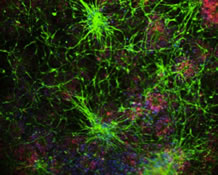Columbia University
Irving Medical Center
Neurological Institute
710 West 168th Street, 3rd floor
(212) 305-1818
About Us
Taub Faculty
Our laboratory studies the relationship of the neuronal cytoskeleton with neurodegenerative diseases. In the mammalian nervous system a variety of neuronal intermediate filament proteins are expressed. Overexpression and mutations of the neuronal intermediate filament proteins leads to neuronal degeneration. Recent studies have shown that neurofilaments are mutated in Charcot-Marie-Tooth disease, an inherited neurodegenerative disease. We are studying the effects that these mutations have on neurofilament assembly and transport to try and understand how these mutations lead to neurodegeneration.
We are also studying the microtubule associated protein tau. One of the hallmarks of Alzheimer's disease is the presence of paired helical filaments, which are composed of tau. Recent studies have identified mutations in tau in a hereditary neurodegenerative disease, Frontotemporal Dementia with Parkinsonism.
By using transgenic models, we hope to determine how these mutations might lead to neurodegeneration. In recent studies, we have also focused on a family of cytoskeletal linker proteins called plakins. These proteins connect cytoskeletal elements to each other and to junctional complexes. Mutations in these proteins lead to a variety of cellular defects, including neuronal degeneration. Two proteins, MACF (microtubule actin crosslinking factor) and Bullous Pemphigoid Antigen 1 (BPAG1) are expressed in the muscle and the nervous system. The neuronal isoforms of these proteins are involved in axon outgrowth and the mouse mutant dystonia musculorum turns out to be a BPAG1 knock-out animal. We are identifying the interactions partners of these two proteins and studying the functions of these proteins in vivo.


